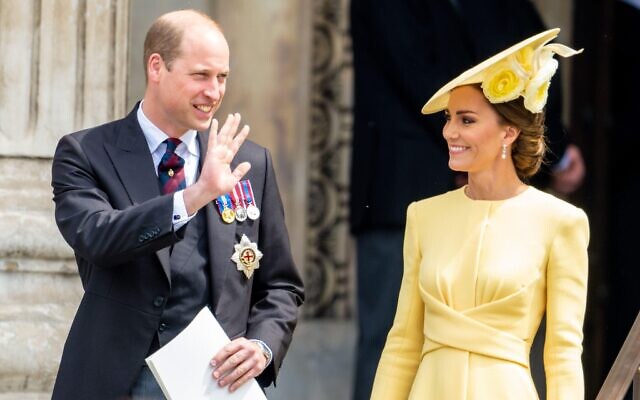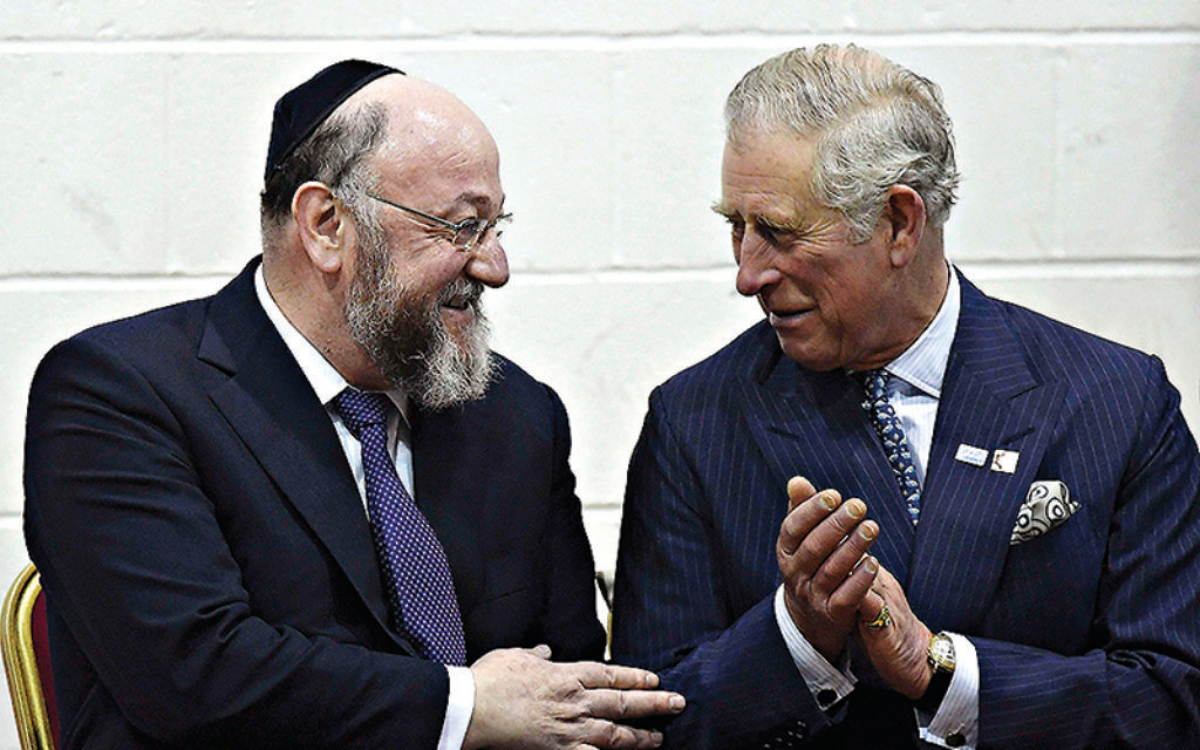Orthodox rabbis don’t go to church, so why was the Chief Rabbi at St Paul’s?
Ephraim Mirvis, along with Board of Deputies president Marie van der Zyl, attended the cathedral on Friday for the prayer service in honour of the Queen’s Platinum Jubilee.

Most Orthodox interpretations of Jewish law conclude that Jews are forbidden to enter churches, even if no prayer will be taking place. So why was Chief Rabbi Ephraim Mirvis present on Friday at St. Paul’s Cathedral, where he attended a prayer service in honour of the Queen’s 70-year anniversary on the throne?
The answer dates back to a ruling from the 1970s by the London Beth Din, the Orthodox rabbinical court, which allows rabbis to attend Christian religious ceremonies only if the rabbi’s presence is requested by the monarch.
And Mirvis’ presence was indeed requested at St. Paul’s, where he joined a select group of dignitaries and clergy, including the Board of Deputies president, for The Queen’s Platinum Jubilee.
Mirvis was among 2,000 attending the Service of Thanksgiving on Friday at St. Paul’s.
All eyes were naturally on Prince Harry and his wife Meghan Markle, whose attendance was the first time in over two years since they moved to California amid a rift in the family over allegations by Markle, whose mother is black, that she was subjected to racist treatment by top members of the royal family.
The Queen, 96, was absent from the ceremony. In a statement by Buckingham Palace said that she is sitting the service out with “great reluctance” after considering the “journey and activity required.” She did take part in a beacon-lighting ceremony on Thursday evening.
Whether Jews may enter churches has been the subject of debate for centuries. Many rabbis who have considered the issue have concluded that churches are the site of avodah zara, or idol worship, which is strictly prohibited under Jewish law.
But others, including in the Conservative movement in the United States, have taken cues from a 13th-century rabbi who decided that Christians were not idol worshippers and decided that entering churches can be permissible – opening the door to interfaith relations.
In the United States, some controversy arose over Rabbi Haskel Lookstein’s participation at the inaugural church services for President Barack Obama, where the Orthodox rabbi recited a non-denominational prayer. He faced criticism from one Orthodox group, but rebuffed it by citing British rabbis’ attendance at events in Westminster Abbey.
Here in the UK, the issue of what to do about royal events was resolved in the 1970s, according to Charedi Orthodox rabbi Herschel Gluck.
“It’s pretty much consensus at this point” that rabbis should not enter churches, he said. But, he told the Jewish Telegraphic Agency, “the only exception is when the monarch requests it.”
Previous Chief Rabbis may have been even more lenient on this point.
The late Rabbi Immanuel Jakobovits, who had held Mirvis’ position for 25 years until 1991, explained his approach in a 1995 book. “After consultation with the [London] Beth Din, my own practice is occasionally to attend church services on royal and state occasions to represent the Jewish community,” he wrote. “But I never actively participate, nor do I wear cap and gown. I find that my Christian hosts usually show understanding and respect for this attitude and its reservations.”
He did not mention a royal invitation as a prerequisite to attending such events.
Part of the reason for the consensus around the concession may be connected to the presence of the royal family in Jewish worship in the United Kingdom.
Since 1801, when the first siddurs, or prayer books, were printed, British Jews have been reciting a prayer for the monarch each Shabbat and on other holy days as part of Shacharit, the morning prayer service. (Dutch Jews have been doing so for even longer, since 1642 at least, and reciting a prayer for the country is common in many countries.)
The current wording of the prayer, from 1962, 10 years after Queen Elizabeth rose to the throne, begins with: “Our Sovereign Lady, Queen Elizabeth (II), Elizabeth the Queen Mother, Philip Duke of Edinburgh, Charles Prince of Wales and all the Royal Family. May the supreme King of kings in his mercy preserve the Queen in life, guard her and deliver her from all trouble and sorrow.”
Mirvis, the chief rabbi, authored a special prayer for the Jubilee, in which he wrote: “Seventy years have passed since Her Majesty the Queen ascended the throne. Together with all our fellow citizens, we fervently pray that she be granted many more years of blessing so that she may continue to bring honour and glory to the Crown and to all her people.
The Jews’ relationship with the British royalty hasn’t always been this harmonious. In 1290, Edward I signed an edict of expulsion for all of the kingdom’s Jews. They did not return until the 17th century, though the politics behind the de-facto lifting of the expulsion are disputed.
Fast forward a few centuries, though, some of Britain’s best-known Jewish persons were prominently present at the Jubilee event for the cameras and behind the scenes.
Marie van der Zyl, president of the Board of Deputies, had front-row seats. She wore a dark-blue dress along with, per the informal dress code, a matching hat, decorated with a white satin fabric.

Thank you for helping to make Jewish News the leading source of news and opinion for the UK Jewish community. Today we're asking for your invaluable help to continue putting our community first in everything we do.
For as little as £5 a month you can help sustain the vital work we do in celebrating and standing up for Jewish life in Britain.
Jewish News holds our community together and keeps us connected. Like a synagogue, it’s where people turn to feel part of something bigger. It also proudly shows the rest of Britain the vibrancy and rich culture of modern Jewish life.
You can make a quick and easy one-off or monthly contribution of £5, £10, £20 or any other sum you’re comfortable with.
100% of your donation will help us continue celebrating our community, in all its dynamic diversity...
Engaging
Being a community platform means so much more than producing a newspaper and website. One of our proudest roles is media partnering with our invaluable charities to amplify the outstanding work they do to help us all.
Celebrating
There’s no shortage of oys in the world but Jewish News takes every opportunity to celebrate the joys too, through projects like Night of Heroes, 40 Under 40 and other compelling countdowns that make the community kvell with pride.
Pioneering
In the first collaboration between media outlets from different faiths, Jewish News worked with British Muslim TV and Church Times to produce a list of young activists leading the way on interfaith understanding.
Campaigning
Royal Mail issued a stamp honouring Holocaust hero Sir Nicholas Winton after a Jewish News campaign attracted more than 100,000 backers. Jewish Newsalso produces special editions of the paper highlighting pressing issues including mental health and Holocaust remembrance.
Easy access
In an age when news is readily accessible, Jewish News provides high-quality content free online and offline, removing any financial barriers to connecting people.
Voice of our community to wider society
The Jewish News team regularly appears on TV, radio and on the pages of the national press to comment on stories about the Jewish community. Easy access to the paper on the streets of London also means Jewish News provides an invaluable window into the community for the country at large.
We hope you agree all this is worth preserving.






















